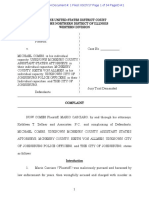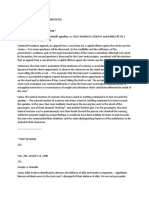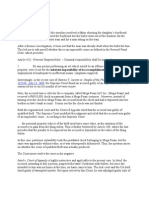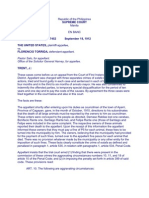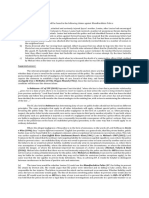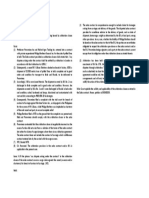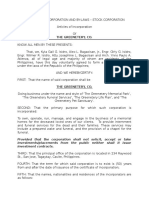Jean-Baptiste Caire Claim: A Comparison With Vicarious Liability in Municipal Law
Jean-Baptiste Caire Claim: A Comparison With Vicarious Liability in Municipal Law
Uploaded by
Alyssa Denise A AverillaCopyright:
Available Formats
Jean-Baptiste Caire Claim: A Comparison With Vicarious Liability in Municipal Law
Jean-Baptiste Caire Claim: A Comparison With Vicarious Liability in Municipal Law
Uploaded by
Alyssa Denise A AverillaOriginal Title
Copyright
Available Formats
Share this document
Did you find this document useful?
Is this content inappropriate?
Copyright:
Available Formats
Jean-Baptiste Caire Claim: A Comparison With Vicarious Liability in Municipal Law
Jean-Baptiste Caire Claim: A Comparison With Vicarious Liability in Municipal Law
Uploaded by
Alyssa Denise A AverillaCopyright:
Available Formats
Jean-Baptiste Caire Claim
A state may be held internationally responsible for the unauthorised acts of state officials, such as the
unlawful killing of a foreign national by an army or police officer, where those officials purported to
act in an official capacity and “used the means placed at their disposition by virtue of that capacity”.
On 11 December 1914, M Jean-Baptiste Caire, a French national, was unlawfully shot and killed at an
army barracks in Mexico by two Mexican army officers, a major and a captain aided by a few
privates, after M Caire refused a demand by one of the officers to pay a sum of money.
In awarding an indemnity in the sum of 20,000 Mexican gold piastres in favour of M Caire’s widow,
the French-Mexican Claims Commission held that Mexico was internationally responsible for the
conduct of the army officers. In this regard, Presiding Commissioner Verzijl observed that, under the
doctrine of objective responsibility (state responsibility for the acts of state officials or state organs
even in the absence of “fault” on the part of the state), a state is internationally responsible for acts
committed by its officials or organs outside their competence if the officials or organs “acted at least
to all appearances as competent officials or organs, or… used powers or methods appropriate to their
official capacity… .” Applying this principle to the facts of the present case, Presiding Commissioner
Verzijl concluded as follows:
“The officers in question … consistently conducted themselves as officers …; in this capacity they
began by exacting the remittance of certain sums of money; they continued by having the victim taken
to a barracks of the occupying troops; and it was clearly because of the refusal of M Caire to meet their
repeated demands that they finally shot him. Under these circumstances, there remains no doubt that,
even if they are to be regarded as having acted outside their competence, which is by no means certain,
and even if their superior officers issued a counter-order, these two officers have involved the
responsibility of the State, in view of the fact that they acted in their capacity of officers and used the
means placed at their disposition by virtue of that capacity.
Indemnity awarded
A comparison with vicarious liability in municipal law
In Jean-Baptiste Caire Claim (above), the unlawful conduct of the army officers who killed M Caire was
imputed or attributed to Mexico for the purposes of state responsibility. An analogy in municipal law is the
vicarious liability in tort of an employer for the conduct of an employee in the course of employment. In the
latter context, provided that there is a sufficient connection between the employee’s conduct and the course of
employment, an employer may be held vicariously liable in tort for the criminal act of an employee, such as the
sexual assault of resident children committed by the warden of a boarding school (Lister v. Hesley Hall Ltd
[2002] 1 AC 215).
The reasoning in Caire may be compared with the decision of the Privy Council (on appeal from the Court of
Appeal of Jamaica) in Bernard v. Attorney General of Jamaica [2004] UKPC 47. In this case, a police officer
purporting to act in that capacity, unlawfully shot Mr Clinton Bernard in the head at point-blank range when Mr
Bernard refused to comply with the police officer’s demand that the police officer be given the use of a public
telephone before Mr Bernard had completed the call he was making. In a judgment delivered by Lord Steyn, the
Privy Council held that the Crown, as the police officer’s employer, was vicariously liable in tort for the police
officer’s unlawful, and almost certainly criminal, conduct. In this regard, the Privy Council emphasised that,
although the police officer was off-duty at the time of the incident, the police officer had purported to act in an
official capacity and had used the service revolver which off-duty police officers routinely were permitted to
carry. Adapting the language of Presiding Commissioner Verzijl in Caire, the police officer in Bernard
engaged the vicarious liability of the Crown in view of the fact that he had purported to act in his capacity as a
police officer and had used the means placed at his disposition by virtue of that capacity.
__________________________________
You might also like
- Chamath Amazon Sohn 2016Document54 pagesChamath Amazon Sohn 2016jackefeller100% (1)
- FL Motion To Disqualify Counsel - Fraud Mortgage AssignmentDocument9 pagesFL Motion To Disqualify Counsel - Fraud Mortgage Assignmentwinstons2311100% (1)
- Definition and Nature of The Practice of LawDocument7 pagesDefinition and Nature of The Practice of LawLaw school100% (1)
- Jean-Baptiste Caire Claim XDocument1 pageJean-Baptiste Caire Claim XWinter WoodsNo ratings yet
- Jean-Baptiste Caire ClaimDocument1 pageJean-Baptiste Caire ClaimLarissaNo ratings yet
- Jean Baptiste Claire ClaimDocument2 pagesJean Baptiste Claire ClaimRoxanne PeñaNo ratings yet
- Jean-Baptiste Caire ClaimDocument1 pageJean-Baptiste Caire ClaimCayen Cervancia CabiguenNo ratings yet
- Pil - Public International Law CasesDocument7 pagesPil - Public International Law CasesDan LocsinNo ratings yet
- Caire ClaimDocument1 pageCaire Claimangelescrishanne100% (5)
- State Responsibility DigestsDocument11 pagesState Responsibility DigestsKelvin ZabatNo ratings yet
- Estate of Timmy Henley v. City of Westminster, Et Al.Document34 pagesEstate of Timmy Henley v. City of Westminster, Et Al.Michael_Lee_RobertsNo ratings yet
- Ewels PDFDocument6 pagesEwels PDFSumaiyah100% (1)
- ViewDocument13 pagesViewglenodhice2004No ratings yet
- Intod v. CA PDFDocument7 pagesIntod v. CA PDFKaren Joy MasapolNo ratings yet
- Case Digests - CrimProDocument7 pagesCase Digests - CrimProSherryAnneSantosNo ratings yet
- Impossible CrimeDocument15 pagesImpossible CrimeLady BancudNo ratings yet
- People v. Capalac, L-38297, 23 October 1982, 117 SCRA 874Document3 pagesPeople v. Capalac, L-38297, 23 October 1982, 117 SCRA 874Carl Jonathan Rivamonte PeñaNo ratings yet
- G.R. No. 103119 October 21, 1992 SULPICIO INTOD, Petitioner, Honorable Court of Appeals and People of The PHILIPPINES, RespondentsDocument99 pagesG.R. No. 103119 October 21, 1992 SULPICIO INTOD, Petitioner, Honorable Court of Appeals and People of The PHILIPPINES, RespondentsSai RosalesNo ratings yet
- 7 Intod Vs CADocument4 pages7 Intod Vs CAJomar TenezaNo ratings yet
- Chapter 3 Trespass PDFDocument6 pagesChapter 3 Trespass PDFRizwan Khan67% (3)
- 1975-1977 Bar Qs & AsDocument14 pages1975-1977 Bar Qs & AsthebeautyinsideNo ratings yet
- G.R. No. 103119 October 21, 1992 SULPICIO INTOD, Petitioner, Honorable Court of Appeals and People of The Philippines, RespondentsDocument6 pagesG.R. No. 103119 October 21, 1992 SULPICIO INTOD, Petitioner, Honorable Court of Appeals and People of The Philippines, RespondentsAxel MendozaNo ratings yet
- Intod V CADocument7 pagesIntod V CAMae Anne PioquintoNo ratings yet
- Facts: Accused-Appellant, Lyndon Flores Did Then and There Willfully, Unlawfully and FeloniouslyDocument7 pagesFacts: Accused-Appellant, Lyndon Flores Did Then and There Willfully, Unlawfully and FeloniouslyIlanieMalinisNo ratings yet
- Sulpicio Intod vs. Honorable Court of Appeals and People of The PhilippinesDocument6 pagesSulpicio Intod vs. Honorable Court of Appeals and People of The PhilippinesJoefritzVaronNo ratings yet
- TITLE 7 - Digest Crim LawDocument4 pagesTITLE 7 - Digest Crim LawLourie Mae CalopeNo ratings yet
- MikmikDocument71 pagesMikmikjoshstrike21No ratings yet
- 38 PP Vs VillalbaDocument14 pages38 PP Vs VillalbaElaine HonradeNo ratings yet
- Rule 111 COMPILEDDocument19 pagesRule 111 COMPILEDMishel EscañoNo ratings yet
- 9 - Intod Vs CA GR 103119Document4 pages9 - Intod Vs CA GR 103119Mark Lester Lee AureNo ratings yet
- Case No. 1: U.S.A. vs. Reyes, G.R. No. 79253, March 1, 1993Document35 pagesCase No. 1: U.S.A. vs. Reyes, G.R. No. 79253, March 1, 1993Fritzie G. PuctiyaoNo ratings yet
- Art 14 Cases AggravatingDocument335 pagesArt 14 Cases AggravatingNon ConformistNo ratings yet
- Mario Casciaro LawsuitDocument36 pagesMario Casciaro LawsuitNorthwest HeraldNo ratings yet
- Law of TortDocument7 pagesLaw of Tortokidirichard220No ratings yet
- Amended Lawsuit From "Midland Christian Five" To City of MidlandDocument44 pagesAmended Lawsuit From "Midland Christian Five" To City of MidlandNewsWest 9No ratings yet
- Intod vs. CADocument4 pagesIntod vs. CAAnonymous oDPxEkdNo ratings yet
- Crim I Cases IIDocument79 pagesCrim I Cases IISara Andrea SantiagoNo ratings yet
- Doctrine of State ImmunityDocument15 pagesDoctrine of State ImmunitysaitiNo ratings yet
- 10 People vs. ManaliliDocument46 pages10 People vs. Manalilishlm bNo ratings yet
- R V Morgan (Martin Meldrum)Document6 pagesR V Morgan (Martin Meldrum)xakiwod277No ratings yet
- Cases 51-60 CONDE - LUMANOGDocument10 pagesCases 51-60 CONDE - LUMANOGkwonpenguinNo ratings yet
- Criminal Law CasesDocument14 pagesCriminal Law Casesmimisabayton100% (1)
- Metrobank Vs Custodio - 2. People Vs PinedaDocument2 pagesMetrobank Vs Custodio - 2. People Vs PinedaJessette Amihope CASTORNo ratings yet
- Impossible CrimeDocument2 pagesImpossible CrimeReeve Carlo Trinidad VillarmenteNo ratings yet
- Contract p3 Fisher V BellDocument19 pagesContract p3 Fisher V BellkevinNo ratings yet
- CHAP 9 Pil NotesDocument20 pagesCHAP 9 Pil NotesNAANTININo ratings yet
- Bah - Amended Complaint - TO FILE (12 9 13)Document27 pagesBah - Amended Complaint - TO FILE (12 9 13)Christopher RobbinsNo ratings yet
- Cruz vs. PeopleDocument26 pagesCruz vs. PeopleJustin GarciaNo ratings yet
- 11.2.2. PP V MarcosDocument12 pages11.2.2. PP V Marcosjanabel28No ratings yet
- Crim Law Case Digests 18-23Document3 pagesCrim Law Case Digests 18-23donyacarlottaNo ratings yet
- Lawsuit Filed by Khairi Williams Against CMPD, City of CharlotteDocument19 pagesLawsuit Filed by Khairi Williams Against CMPD, City of CharlotteWCNC DigitalNo ratings yet
- Aggravating CasesDocument114 pagesAggravating CasesRonn PetittNo ratings yet
- MHP Garments Vs C, Puno. C, JDocument5 pagesMHP Garments Vs C, Puno. C, JA Paula Cruz FranciscoNo ratings yet
- Public Bodies Sample Q&ADocument3 pagesPublic Bodies Sample Q&AWinnie LauNo ratings yet
- Crim 2 Digests 84-93Document5 pagesCrim 2 Digests 84-93likegNo ratings yet
- 5 - 2023 UP BOC Criminal Law LMTs v2Document18 pages5 - 2023 UP BOC Criminal Law LMTs v2Azel FajaritoNo ratings yet
- U.S. v. Gumban, G.R. No. L-13658, 1918Document4 pagesU.S. v. Gumban, G.R. No. L-13658, 1918Val SanchezNo ratings yet
- 1 Youmans ClaimsDocument3 pages1 Youmans ClaimsSelynn CoNo ratings yet
- Torts Law NotesDocument11 pagesTorts Law NotesSANGETHAA A P VEERASINGAM UnknownNo ratings yet
- Case DigestDocument9 pagesCase DigestJamesAnthonyNo ratings yet
- Eeoc: the Real Deal: (Equal Employment Opportunity Commission)From EverandEeoc: the Real Deal: (Equal Employment Opportunity Commission)No ratings yet
- Letter (Generic) InvitationDocument1 pageLetter (Generic) InvitationAlyssa Denise A AverillaNo ratings yet
- Ate Lytch IpDocument4 pagesAte Lytch IpAlyssa Denise A AverillaNo ratings yet
- Are Social Media Posts Admissible in Evidence?Document4 pagesAre Social Media Posts Admissible in Evidence?Alyssa Denise A AverillaNo ratings yet
- Affidavit of DesistanceDocument5 pagesAffidavit of DesistanceAlyssa Denise A AverillaNo ratings yet
- This Is To Turn Over The Following Excess Materials To The Undersigned DepartmentDocument1 pageThis Is To Turn Over The Following Excess Materials To The Undersigned DepartmentAlyssa Denise A AverillaNo ratings yet
- Constitutional Law IDocument2 pagesConstitutional Law IAlyssa Denise A AverillaNo ratings yet
- Private Acts and Contracts Statute (Ejusdem Generis) Emeteria Liwag, Petitioner vs. Happy Glen Loop Homeowners ASSOCIATION, INC.,RespondentDocument10 pagesPrivate Acts and Contracts Statute (Ejusdem Generis) Emeteria Liwag, Petitioner vs. Happy Glen Loop Homeowners ASSOCIATION, INC.,RespondentAlyssa Denise A AverillaNo ratings yet
- Digested Cases CompilationFULLDocument39 pagesDigested Cases CompilationFULLAlyssa Denise A AverillaNo ratings yet
- Consti Case DigestsDocument18 pagesConsti Case DigestsAlyssa Denise A AverillaNo ratings yet
- Heirs of Emiliano Navarro vs. Intermediate Appellate Court & Heirs of Sinforoso PascualDocument11 pagesHeirs of Emiliano Navarro vs. Intermediate Appellate Court & Heirs of Sinforoso PascualAlyssa Denise A AverillaNo ratings yet
- Republic of The Philippines, vs. Amanda Lat Vda. de Castillo, IssueDocument21 pagesRepublic of The Philippines, vs. Amanda Lat Vda. de Castillo, IssueAlyssa Denise A AverillaNo ratings yet
- 3 CSC Vs Ramoneda-PitaDocument3 pages3 CSC Vs Ramoneda-PitaRicaNo ratings yet
- Puromines Inc V CADocument1 pagePuromines Inc V CAJanice LivingstoneNo ratings yet
- Characteristics of PropertyDocument1 pageCharacteristics of PropertyDavide LeeNo ratings yet
- Munoz V Del Barrio, 51 OG 5217 (1955)Document2 pagesMunoz V Del Barrio, 51 OG 5217 (1955)jimmy100% (2)
- Polaris IP, LLC v. Google Inc. Et Al - Document No. 113Document6 pagesPolaris IP, LLC v. Google Inc. Et Al - Document No. 113Justia.comNo ratings yet
- Filed Complaint RedactedDocument13 pagesFiled Complaint RedactedHeavyNo ratings yet
- Criminal ComplaintDocument2 pagesCriminal ComplaintRAJENDRA TATKARE0% (1)
- Sps. Uy vs. AdrianoDocument21 pagesSps. Uy vs. AdrianoHannah MedesNo ratings yet
- Contract 1 MCQ WordDocument9 pagesContract 1 MCQ WordASHISH CHETTRINo ratings yet
- AgPart 925 - TrustDocument130 pagesAgPart 925 - Trustcezar delailaniNo ratings yet
- Tanada Vs Cuenco Separation of PowersDocument2 pagesTanada Vs Cuenco Separation of PowersEdrix CrisologoNo ratings yet
- Lok Adalat ReportDocument7 pagesLok Adalat ReportSuyash BhamoreNo ratings yet
- Civ Pro Outline 5Document3 pagesCiv Pro Outline 5Joseph MacalintalNo ratings yet
- Meralco Vs YatcoDocument4 pagesMeralco Vs YatcoArkhaye SalvatoreNo ratings yet
- Divorce and OthersDocument5 pagesDivorce and Othersariel lapiraNo ratings yet
- The Acquisition ProcessDocument3 pagesThe Acquisition ProcessYuriUstinov100% (1)
- Graham V RichardsonDocument1 pageGraham V Richardsonlaura4553No ratings yet
- Abnormally Low TendersDocument4 pagesAbnormally Low TendersAbd Aziz MohamedNo ratings yet
- Hlurb Jurisdiction BrieferDocument2 pagesHlurb Jurisdiction BrieferDavid CagahastianNo ratings yet
- G.R. No. 211751 Jalandoni V OmbudsmanDocument2 pagesG.R. No. 211751 Jalandoni V OmbudsmanFrances Ann TevesNo ratings yet
- AoiDocument6 pagesAoiKyla IsidroNo ratings yet
- 16 G.R. No. 111397 - Lim v. Court of AppealsDocument11 pages16 G.R. No. 111397 - Lim v. Court of AppealsCamille CruzNo ratings yet
- Doctrine of Election 35Document6 pagesDoctrine of Election 35Shashikant SauravNo ratings yet
- Supreme Court: Republic of The Philippines ManilaDocument12 pagesSupreme Court: Republic of The Philippines Manila美咲剛No ratings yet
- South Cotabato Communications Corporation vs. Sto. TomasDocument30 pagesSouth Cotabato Communications Corporation vs. Sto. TomasElvin BauiNo ratings yet
- Joseph Wolf Vs City of Los AngelesDocument39 pagesJoseph Wolf Vs City of Los Angelesali_winstonNo ratings yet
- Pbcom V Ca 269 Scra 695Document7 pagesPbcom V Ca 269 Scra 695Jerommel GabrielNo ratings yet
































